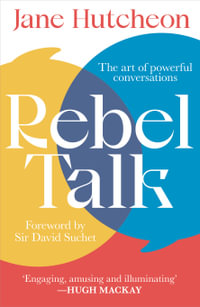The brilliant writing, lucid thinking, and authentic passion in these pages make The Evasion-English Dictionary one of the most readable and incisive exposures of linguistic camouflage I have ever encountered."
--Richard Lederer, author of Anguished English
"A stimulating collection that will sharpen your ears and stretch your mind."--Thomas Szasz, author of The Untamed Tongue: A Dissenting Dictionary
"If your bedside table pile includes Bierce and Mencken, you'll want to add this book to the stack. It's a pleasurable skewering of evasive language (even when it's your evasions that are the ones, like, being skewered), done with such gorgeous logic and good humor that you DO feel the terrible urge to read bits of it out loud to those nearest and dearest to you. Ignore that urge and give those near and dear their own copies. (Just don't be surprised when they start to read aloud to YOU.)"--Erin McKean (Wordnik)
"It's Ambrose Bierce meets Erving Goffman!" --Christopher Roth, cultural and linguistic anthropologist
"Actually pretty good!"--The Belladonna Comedy
Publishers Weekly:
"Cultural criticism takes the form of a dictionary in this slender, amusing volume. Balistreri has become aware-and wants to make us all aware-of the little linguistic games we play in order to "duck the truth," the words we use not to reveal our meaning but to mask it. Saying "I feel unproductive," she notes, is more acceptable to ourselves than plainly stating, "I am unproductive." Or how about "I hate to say it but..." (as in "I hate to say she's fat...")? Balistreri unearths the underlying meaning: "I can't believe I'm saying this; it's so uncharacteristic of me." Balistreri, who runs the language and poetry webzine CafeMo.com, is a subtle interpreter of linguistic evasions and rhetorical tics. Read this, and you may think twice the next time you're tempted to say "like" (translation: "think, brain, think!")."
Jackie Gropman, School Library Journal:
"Adult/High School-The author takes on the real meaning of "whatever," "like," "I think," and other common words and phrases that put spin on meaning and avoid honest communication. Arranged alphabetically, each entry includes a paragraph of explanation of the evasive word and suggests substitute definitions. There are more than one or two meanings for frequent words. "Whatever" has the most-they include the "apathetic" whatever, the "yeah so" whatever, the "who am I to judge" whatever, and the "faltering cliche" whatever. The word "like" also has several uses here, one of which is the staller. "Poetry, yeah me too. I love like Robert Frost." And "You're from Belize? That's like, South?" The word "think" is used to replace the more truthful "know." "I just wanted to explain and apologize for just up and leaving like that. I mean, I didn't want you to think I'm an asshole or something." Teens will recognize these speech evasions and excuses in everyday language and may be inspired to try out the blunt definitions in their own conversation and writing. Do these dodges promote civility or conceal the truth and promote sloppiness? This tiny, sturdy paperback will inspire debate and discussion in the cafeteria and the classroom."
























